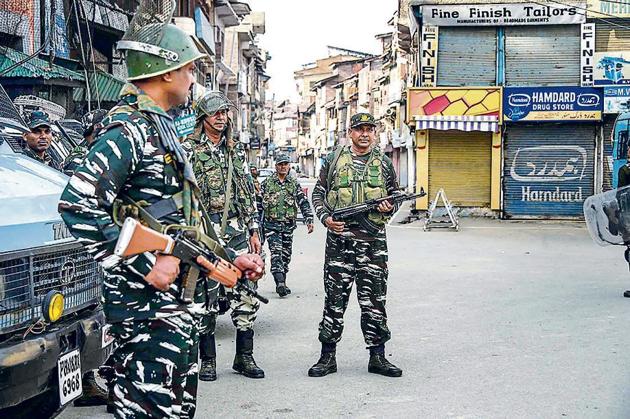Kashmir schools set to open, govt offices get back to work
The restrictions and communications blackout were imposed ahead of parliament passing resolutions and laws to bifurcate J&K into two Union Territories, and scrap constitutional provisions giving the state special status (Article 370) and its people special privileges (Article 35A).
The Jammu & Kashmir administration on Friday said schools in the Valley would start working from Monday, telecom connectivity be restored in phases, and that government offices are now “fully functional”, easing restrictions that were enforced on August 5.

The decisions were announced at a press conference on Friday afternoon, after another Friday passed relatively peacefully in the Valley; Fridays are when prayers are held in mosques and, over Kashmir’s long decades of strife, have proven to be volatile.
The restrictions and communications blackout were imposed ahead of parliament passing resolutions and laws to bifurcate Jammu & Kashmir into two Union Territories, and scrap constitutional provisions giving the state special status (Article 370) and its people special privileges (Article 35A).
The decision to ease restrictions and restore communication was taken after top officials reviewed the situation across the state, especially in the Kashmir valley, over the past few days. On Friday, restrictions were imposed in many parts of the city and Friday prayers were not allowed at some prominent mosques including the Jamia Masjid in Srinagar.
J&K chief secretary, BVR Subrahmanyam said 12 of the 22 districts in the region are functioning normally with some limited restrictions in five of these. “The measures put in place have ensured that there has not been a single loss of life or serious injuries during the course of maintaining peace and order.’’
Interestingly, a little while before the restrictions were partially lifted, protests erupted around Jinab Sahab Soura soon after Friday prayers. The protestors were carrying placards against the nullification of Articles 370 and 35A.
There have been occasional lifting of restrictions over the past 13 days, especially in the run up to Eid on Monday, but this is the first time the communication blackout is being lifted.
Subrahmanayam said restrictions were relaxed on Saturday and Sunday so that people could do their Eid shopping. “Relaxation was also given on the day of Eid to enable people to perform prayers which was done in large numbers. People were also allowed to go around and meet their friends and relatives and exchange Eid gifts. Some restrictions, however, were required on August 14 and 15 in view of Independence Day celebrations yesterday (Thursday) for which the terror threat level was certainly greater.’’
Subrahmanyam said that keeping in view the evolving situation, as well as the cooperation of people in maintaining peace, the government has now taken measures to ease restrictions in a calibrated manner.
He added that telecom connectivity will gradually be restored in a phased manner keeping in mind the constant threat posed by terrorist organisations in using mobile connectivity to organise terror actions. There was immediate restoration of some connectivity. Most lines would be functioning before the weekend is over, Subrahmanyam added.
However, there was no announcement regarding the release of any of the political leaders, including former chief ministers Omar Abdullah and Mehbooba Mufti, who have been arrested or are in preventive detention. Subrahmanyam said that the preventive detentions are being continuously reviewed and appropriate decisions will be made based on law and order assessments. “It is expected that within next few days as the restrictions will get eased, life in Jammu and Kashmir will become completely normal,’’ he said.
Subrahmanyam explained that the restrictions and communications blackout were necessitated by intelligence inputs on terror strikes.
“...there were credible inputs that terrorist organisations were planning to carry out strikes in the state in the near future. Steps consequently taken, restrictions on free movement, prevention of large gatherings, restrictions on telephone connectivity and closure of schools and colleges..... A few preventive detentions of individuals were also made in accordance with the provisions of law to maintain law and order...” he said.
He denied that there was a shortage of essentials; or that media people weren’t allowed to go about their work.
“There was no shortage of essentials, hospitals continued to function, electricity, water supply and sanitation facilities were maintained,” Subrahmanyam said.
He added that a media centre has been opened to enable media cover events in the state and that “senior officers were briefing media on daily basis.’’
“All major networks, satellite and cable television networks are operational, newspapers are being published.’’






